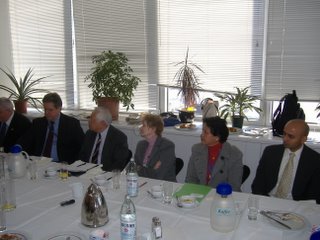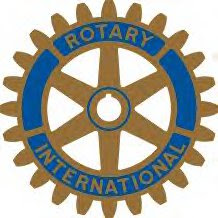 Ms. Isolda Oca, (second from right) Deputy Chief of the NGO Section of the United Nations Department of Pubic Information (UNDPI), along with the Executive Director of the World Federalist Movement, William Pace (left) and Vice Chair of CONGO, Jackie Shapiro, (third from right) met with Rotarians at the International Service Division’s Monthly Breakfast Meeting to outline the role of civil society and non-governmental organizations at the UN. The meeting was moderated by New York Rotarian, Professor Mikio Tajima (second from left). Jay Joshi (right) our newest New York Rotarian also participated.
Ms. Isolda Oca, (second from right) Deputy Chief of the NGO Section of the United Nations Department of Pubic Information (UNDPI), along with the Executive Director of the World Federalist Movement, William Pace (left) and Vice Chair of CONGO, Jackie Shapiro, (third from right) met with Rotarians at the International Service Division’s Monthly Breakfast Meeting to outline the role of civil society and non-governmental organizations at the UN. The meeting was moderated by New York Rotarian, Professor Mikio Tajima (second from left). Jay Joshi (right) our newest New York Rotarian also participated.
Ms. Oca is the liaison officer to the approximately three thousand NGO’s that maintain consultative status with the UN. Originally from the Philippines, where her father and brother were Rotarians, and her family hosted two Rotary exchange students in Manila, Isolda is very familiar with Rotary. She outlined how Rotarians were essential in the creation of the United Nations and that one of the reasons that the unsuccessful predecessor of the UN, the League of Nations, failed was because civil society was not incorporated into the organizational structure. It was a wise decision of U.S. Presidents Franklyn Roosevelt and Harry Truman to insist that Rotarians be involved in the creation of the United Nations. She noted that Article 71 of the UN Charter encouraged NGO cooperation which the UN and that Rotary’s successful Polio-Plus Program could not have been possible without this provision.
Article 71 in Chapter X of the United Nation Charter states:
“The Economic and Social Council may make suitable arrangements for consultation with Non-government organizations which are concerned with matters within its competence. Such arrangements may be made with international organizations and, where appropriate, With national organizations after consultation with the Member of the United Nations concerned.”
Ms. Oca noted that there is a growing force of civil society at the United Nations, and the UNDPI wants to provide assistance. While the United Nations is not an organization of civil society, but of member states, civil society can, and does, have a voice in the process. “Today, the United Nations stands for a world where people of different nations and cultures can look at each other, not with fear and suspicion, but as potential partners to exchange good and ideas for their mutual benefit, and civil society is a vital partner in this endeavor.”
In the last few years, commitment to civil society involment has become evident by the realignment of the UN outreach programs to engage and assist civil society.
They include:
- Recent conference titled “Our Challenge: Voices for Peace Partnership and Renewal”. (Rotary was represented at this conference as well as 700 other organizations. The next conference is scheduled for September, 2006);
- “NGO Briefings” are held every Thursday from 10am to 12pm. UNDPI provides the perspectives of member states, the UN, and that of civil society, on issues pending at the UN;
- Communication and Information-exchange workshops to enhance NGO’s dissemination of information;
- UNDPI library has transformed from a library of book collection to that of people connection;
- Orientation programs for new NGO’s;
- Commission of the Cordoza Report by the Secretary General in 2003 that recommends future and enhanced UN interaction with Civil Society;
- Establishment of NGO “Focal Points” at most UN agencies and Departments;
- Establishment of “Special Advisor for NGO Relations” to the President of the General Assembly;
- Significant NGO input in the 2005 Outcome Document as examplified by “No development without security, no security without development, and no security without human rights”.
Bill Pace, the Executive Director of the World Federalist Movement, and considered by many as one of the leading experts in NGO and UN partnerships, pointed out that the United States contributes approximately $4 billions a year in to the UN system or about $13 per capita; Norway contributes approximately $125, Netherlands $45, France $18 and Canada with $8 per capita. Compared to all-level government spending at the national, state, and local levels where total government spending in the United States is approximately $20,000 per person, relatively very little spending is done at the international, or global, level. As such, with increasing responsibilities and challenges including, poverty eradication, environmental degradation, terrorism, peace keeping, etc., the UN needs to tap the resources and the expertise available from NGO’s and Civil Society.
The World Federalist Movement, once headed by Sir Peter Ustinov, is an international citizen's movement working for justice, peace, and sustainable prosperity. They lobby for an end to the rule of force, through a world governed by law, based on strengthened and democratized world institutions. World federalists support the creation of democratic global structures accountable to the citizens of the world and call for the division of international authority among separate-agencies.
Jackie Shapiro, vice-chair of CONGO (The Conference of NGOs in Consultative Relationship with the United Nations), outline the work of her organization. For more than 50 years, Congo has been actively promoting the involvement of NGOs in working with United Nations, especially in developing countries and in achieving the UN’s Millennium Goals and currently represents more that 500 NGO's. http://www.ngocongo.org/
As stated on their web site, CONGO assists a variety of nongovernmental organizations in consultative status to promote their common aim of supporting the United Nations Charter. It works on behalf of nongovernmental organizations in consultative status to develop that status and improve their relationship and cooperation with the United Nations and its various organs. It also provides a forum for nongovernmental organizations with common interests to come together to study, plan, support, and act in relation to the principles and programs of the United Nations
As defined by the UNDPI, a non-governmental organization (NGO) is any non-profit, voluntary citizens' group which is organized on a local, national or international level. Task-oriented and driven by people with a common interest, NGOs perform a variety of services and humanitarian functions, bring citizens' concerns to Governments, monitor policies and encourage political participation at the community level. They provide analysis and expertise, serve as early warning mechanisms and help monitor and implement international agreements. Some are organized around specific issues, such as human rights, the environment or health. Their relationship with offices and agencies of the United Nations System differs depending on their goals, their venue and their mandate.
Historically, NGO’s with consultative status are divided into three categories:
- Those organizations with a basic interest in most of the activities of the Council.
- Those organizations which have a special competence in, and are concerned specifically with, only a few of the Council’s fields of activity.
- Those organizations which have a significant contribution to make to the work of the Council which may be placed on a register for ad hoc consultations.
NGOs applying for association with UNDPI should satisfy the following requirements: - Must support and respect the principles of the Charter of the United Nations;
- Must be of recognized national or international standing;
- Should operate solely on a non-for-profit basis and have tax-exempt status;
- Must have the commitment and the means to conduct effective information programs with its constituents and to a broader audience about UN activities by publishing newsletters, bulletins and pamphlets; organizing conferences, seminars and round tables; or enlisting the attention of the media;
- Should have an established record of continuity of work for a minimum of three years and should show promise of sustained activity in the future;
- Should have a satisfactory record of collaboration with UN Information Centers/Services or other parts of the UN System prior to association;
- Should provide an audited annual financial statement, conducted by a qualified independent accountant;
- The NGO should have statutes/bylaws providing for a transparent process of taking decisions, elections of officers and members of the Board of Directors.









